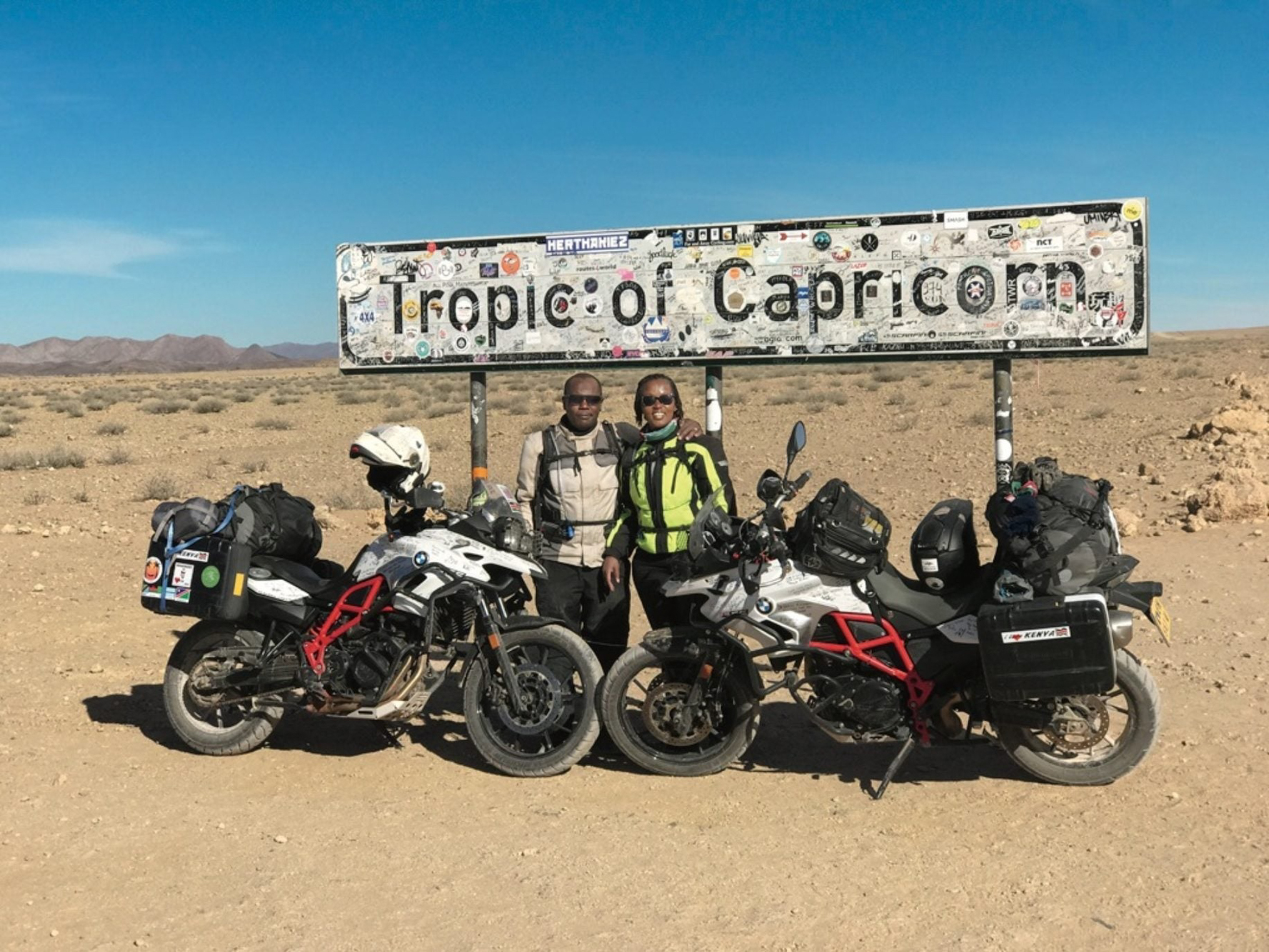It’s an emotional time for Dos and Wamuyu of Throttle Adventures. Like many overland travellers, COVID-19 has thrown a wrench into their travel plans. After two years, five continents, 24 countries, four months of quarantine in Managua, Nicaragua, two bikes in a shipping container, and COVID-19 restrictions lifting just enough, the couple is set to return home to Kenya in August. The pandemic has effectively halted their quest to be the first African couple to motorcycle around the world—for now. Dos and Wamuyu radiate warmth, a passion for travel, and a love for adventure and life on the road. We doubt anything will stop these two from achieving their goal.
In the spirit of being homeward bound, I sat down with Dos and Wamuyu to talk about all things Kenya. You’ll be eager to include Kenya in your future travel plans after reading what these two have to say about their diverse and vibrant country.
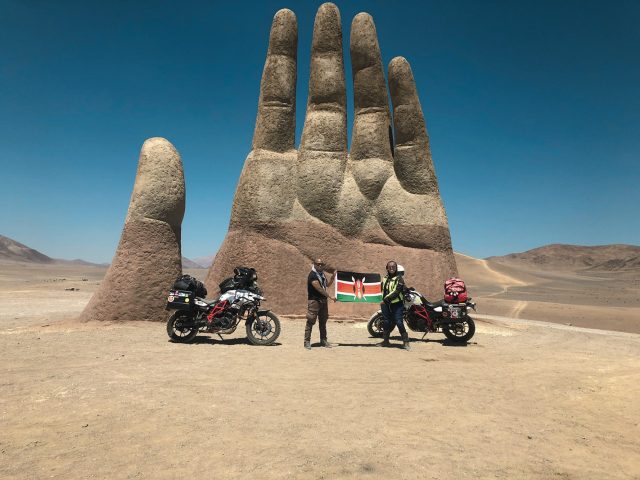
One of the main goals of your trip is to represent Kenyans and tell the story of your country around the world, straight from the source. Can you tell us more about this?
Wamuyu: For the longest time, the story of Kenya has been told by foreigners. We want to take the story of Kenya to the world, ridden and delivered on Kenyan motorbikes. We want as many as possible to visit our country, because, unlike what you hear on the news, Kenya is safe, beautiful, and the ultimate destination for your holiday.
We also want to explore beyond the Kenyan borders, beyond prejudices, and beyond our usual comfort zone. We want to see the world with our own eyes, make our own experiences, and enjoy foreign countries, cultures, and traditions.

What are your favourite parts of your home country?
Wamuyu: I love Lake Naivasha. It’s a freshwater lake located near the city with a number of things to do. The area offers a mix of everything from camping to hiking, boat tours on the lake, cycling, and wildlife spotting.
Dos: Kenya is such a diverse country. We have deserts, mountains, and beaches on the coast. We’re on the equator, but the whole country has a good climate year-round. The capital city, Nairobi, is diverse and vibrant—comparable to a small New York City. The people of Kenya are very hospitable and loving. Everyone wants to help you and talk with you. You’ll never feel lonely.
What are some must-visit spots that overlanders should add to their Kenyan travel itinerary?
Dos: The Chalbi Desert in the north is a must. The dry lakebed and sand dunes look similar to those in Dubai. If you like hiking, Mount Kenya is the highest mountain in the country, at 17,057 feet, and the second-highest mountain in Africa. There are eight routes up to the top, and everyone, depending on their ability, can find a route up the mountain. The park isn’t far from Nairobi, only 150 kilometres.
Wamuyu: Visiting the national parks is a must and it is easy to do as there are 23 of them in the country. Nairobi National Park is a great stop, especially if you have a layover, as the park is right in the city. You can leave the airport and, in less than half an hour’s drive, see buffaloes, giraffes, lions, leopards, baboons, zebras, and cheetahs. Kenya is the only country with a national park in the city, which makes it very special. While in Nairobi, make sure you hit the Nairobi National Museum and Sheldrick Wildlife Trust (elephant orphanage).
You must also go to the coast. The beaches and turquoise-blue ocean are Cancun-like. We usually visit Mombasa to swim in the ocean and eat good food. We love the sunset boat rides that come with cocktails, music, and sometimes a barbeque too. You can also sign up for luxury dinner cruises there. We still don’t have the right clothes for that (a tuxedo and evening dress); there are, however, so many other things to do depending on whether your travel style is a chilled one or based on adventure.
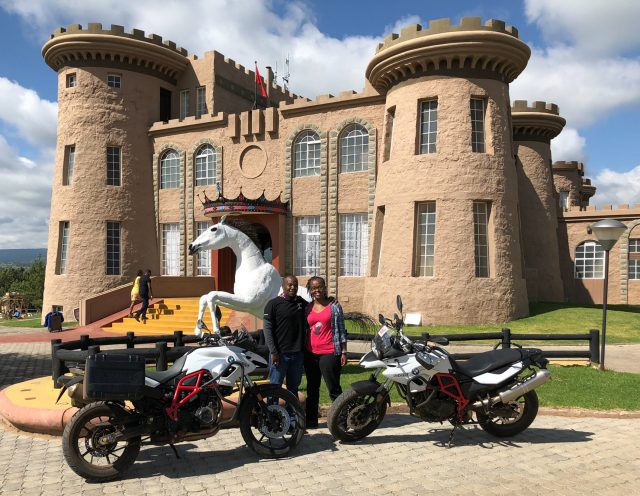
Tafaria Castle, Kenya, 2018
Where are your favourite places to camp in Kenya?
Wamuyu: We love the Kenya Wildlife Service Campgrounds. They are inexpensive and come with the necessary basic requirements. For a more luxurious private campground, we like Camp Carnelley’s near Lake Naivasha.
What are some Kenyan foods that you miss from home?
Dos: We have nyama choma, which is grilled meat—usually goat or beef, sometimes fish or chicken. Mutura is Kenyan sausage, and the Brits have something similar in the UK called blood sausage. The most popular fish is tilapia. It’s deep-fried or cooked in some broth and served whole with ugali (a polenta-like dish), chapati (flatbread) or mukimo (a combination of mashed potatoes and green vegetables). We love deep-fried tilapia served with chapati. Gravy is also frequently served on the side. Make sure not to miss the classic combination of chapati and chai—a breakfast fit for a king and queen.
Wamuyu: There is also the Tusker beer, one of the most well-known lagers in the country. Then there is the Konyagi Gin. This one is not Kenyan but Tanzanian. It is our all-time favourite.
Wamuyu, tell us about your campaign to bring accessible, affordable, and safe helmets to motorcycle riders in Kenya.
This is a personal, intimate project. Due to Kenya’s economy, there are a lot of people selling cheap products, and we have challenges accessing good helmets. Importation fees make helmets expensive to buy, so many riders won’t wear one because they can’t afford it. Bike shops in Kenya usually purchase bikes in bulk from manufacturers in India and China. These manufacturers give free helmets with the purchase of a motorcycle as a marketing incentive. Unfortunately, these token helmets are useless and don’t meet the safety standards.
Many people in Kenya are not aware of how important a helmet is. There is currently nothing in place to educate people about safety, so many riders don’t know which helmets are unsafe and how to find out. My mission is to provide education on all aspects of this topic. I’m currently using social media to spread the word.
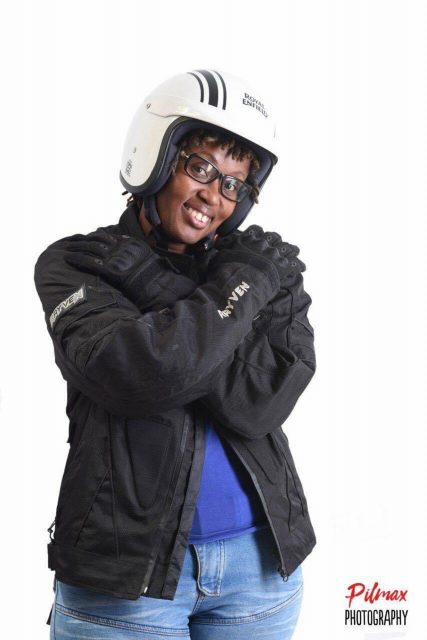
You also plan to address this issue once you’re back on the ground in Kenya.
Wamuyu: Yes. The Kenya Bureau of Standards (KEBS) sets the minimum safety standard for helmets in the country. When I return to Kenya, I will look at the documents (they have to be physically purchased), and from there, can address the token helmets that don’t meet the standards. I’ve worked with the government in the past to change policies, but I would also like to set up a non-profit organization focused on raising awareness and contributing a percentage of profits to accessing affordable helmets in Kenya. It is also important to work with those selling riding gear with a goal of sourcing affordable and safe helmets together.
Where can interested folks learn more about this subject?
Wamuyu: I’ve filmed several YouTube videos on the subject: Is Your Helmet Safe?, Stop These Killer Helmets, and How To Spot A Fake Helmet.
Each of you undertook solo rides throughout Africa before your round-the-world trip. Dos rode from Kenya to South Africa and back on a 180cc bike, and Wamuyu rode 3,100 kilometres across Tanzania. What did each of you learn from these trips?
Dos: It gave me a renewed sense of humanity. The kindness, love, and help that I received on that three-month-long trip were amazing. It’s also a lot easier to travel in Eastern Central South Africa than people think. I found it was very easy. For tourism reasons, we didn’t need to apply for visas ahead of time. The roads are good, the people are hospitable, and the accommodation is fair.
Wamuyu: I learned how to think like a biker, plan and execute my plans, map routes, read maps, and make decisions on my own. I was used to Dos doing a lot of these things because he already had the experience, and he is also very caring. But this solo trip opened me up to being more independent, and I learned how to think as a biker on my own.

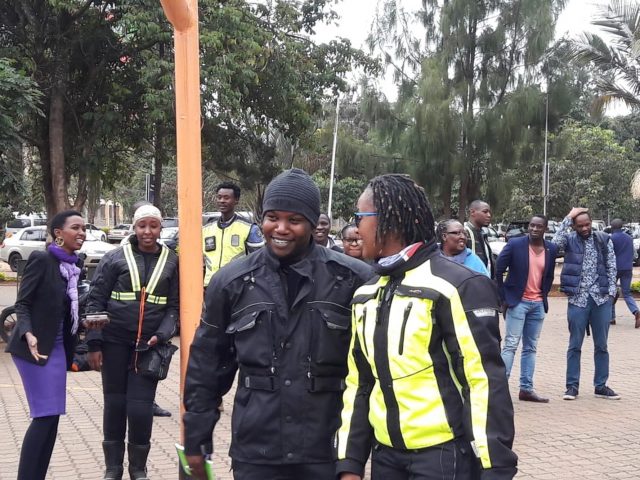
You recently celebrated your fourth wedding anniversary. How has traveling together full-time changed your relationship?
Dos: Initially, it was a bit tough because I used to work many hours, and Wamuyu had a full-time job as well. Now we spend a lot of time together, sometimes 24/7. We’ve learned to enjoy each other’s company and are never bored. Now, when we return home, it will be the opposite—we won’t be spending 24/7 with each other anymore.
Wamuyu: It was an adjustment. In Kenya, we would be apart for a full day and then return home with excitement to catch up. On the road, we see and experience everything together, so we have learned to create new conversations. We’ve found ourselves making more friends and traveling with other people we’ve met on the road.
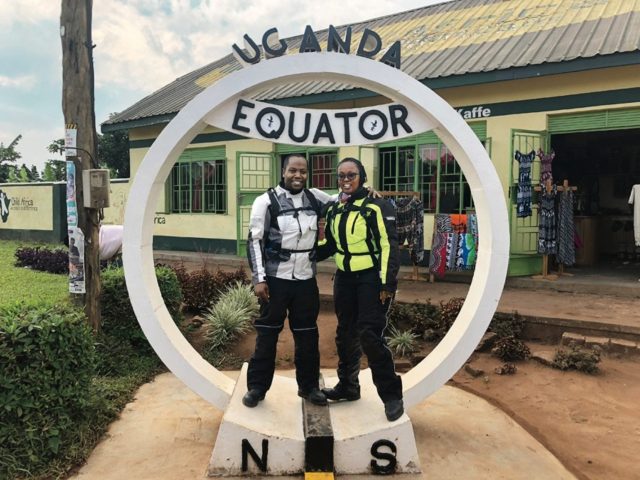
You chose BMW F 700 GS bikes for your round the world tour. Why?
Dos: We initially wanted to go with Royal Enfield, but they were too slow and not as responsive. While riding the BMWs, we can put our feet down, the riding is comfortable, and maintenance and support are available worldwide, which is really awesome.
Wamuyu: When the time came for planning our three-year world tour, we went all-out looking for bikes to use for the trip. We visited showrooms and researched heavily online. The BMW comes highly recommended for travelling around the world and is Europe’s bike of choice. Many of the other bikes were big and heavy, and with the extra weight (I carry a lot of T-shirts), I felt the difference. I would even go a bit lighter if [making] the trip again.
Wamuyu, you are the Kenyan/Tanzanian ambassador for the Women Riders World Relay, and Central East Africa boasts the largest number of women riders on the African continent. What makes this region unique?
There are cultural and socioeconomic reasons why Kenya is more open to women riders than most of our neighbouring countries. First of all, Kenya has the biggest economy in Eastern and Central Africa, giving more people financial opportunities to purchase bikes. Compared with some of our neighbouring countries, Kenya has many more suppliers. This has helped reduce the price of motorcycles for sale. Culturally, Kenya is more diverse, and as much as we still hold on to our culture, there has been great success in women’s empowerment.
We also have to credit the support that we have. In Kenya, the men who ride are very [encouraging] of women riders. We have great support from our male counterparts, who are also husbands, brothers, friends, and fiancées. Currently, there are no female-run motorcycle training schools, but the training schools we do have are very accommodating to women. I went on Google and Facebook, and in 2015, I found a motorcycle group on Facebook called African Motorcycle Diaries. I posted, “Looking for a riding school where I can learn more than just moving a bike, but I can learn safe riding and more about the bikes.” I got [an] overwhelming response. Guys are really supportive there, are not selfish with information, and are great mentors to women.
We currently have five women’s motorcycle clubs in Kenya: the Throttle Queens, Inked Sisterhood, Heels of Steel, Piki Dada, and the Women Bikers’ Association (WBA). The latter encompasses all of the clubs. In this community, anyone can join. We’re at nearly 200 members now. When women start riding, they do not keep it to themselves. As soon as we’re out there, we’ll talk to anyone riding bikes. Whether women are looking to find mentors or more information about buying a bike, we all support each other.
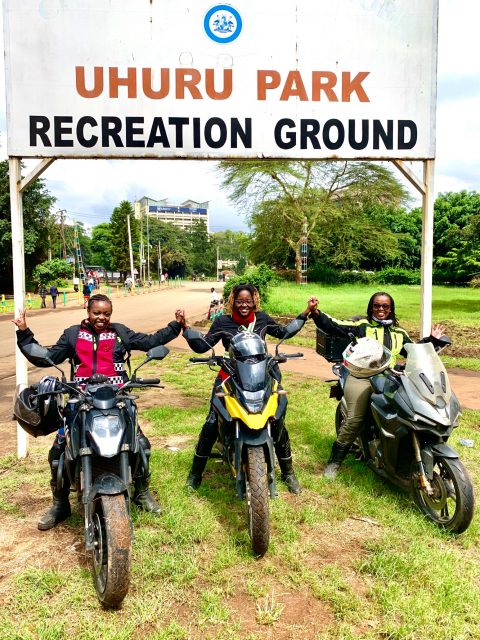
Find Dos and Wamuyu of Throttle Adventures Online:
Instagram: @throttleadventures.ke | @wamuyu | @doskariuki
YouTube: Throttle Adventures
Facebook: @throttleadventures
Twitter: @ThrottleAdv_ke | @doskariuki | @wamuyunkariuki
Wamuyu’s Website: wamuyu.com
Ashley Giordano completed a 48,800-kilometer-overland journey from Canada to Argentina with her husband, Richard, in their well-loved but antiquated Toyota pickup. On the zig-zag route south, she hiked craggy peaks in the Andes, discovered diverse cultures in 15 different countries, and filled her tummy with spicy ceviche, Baja fish tacos, and Argentinian Malbec. You can usually find Ashley buried in a pile of travel books, poring over maps, or researching wild medicinal plants. Ashley is a co-founder of Women Overlanding the World and crew member of Expedition Overland. You’ll find this Canadian-born couple exploring a different continent in 2021, and sharing their trip every step of the way at Desk to Glory.


